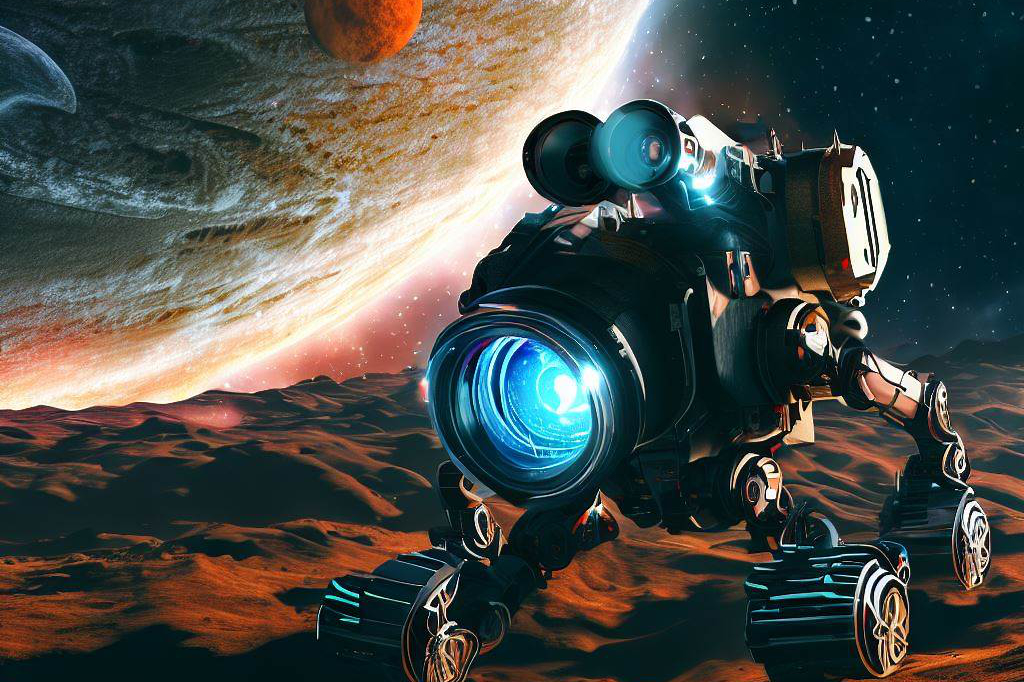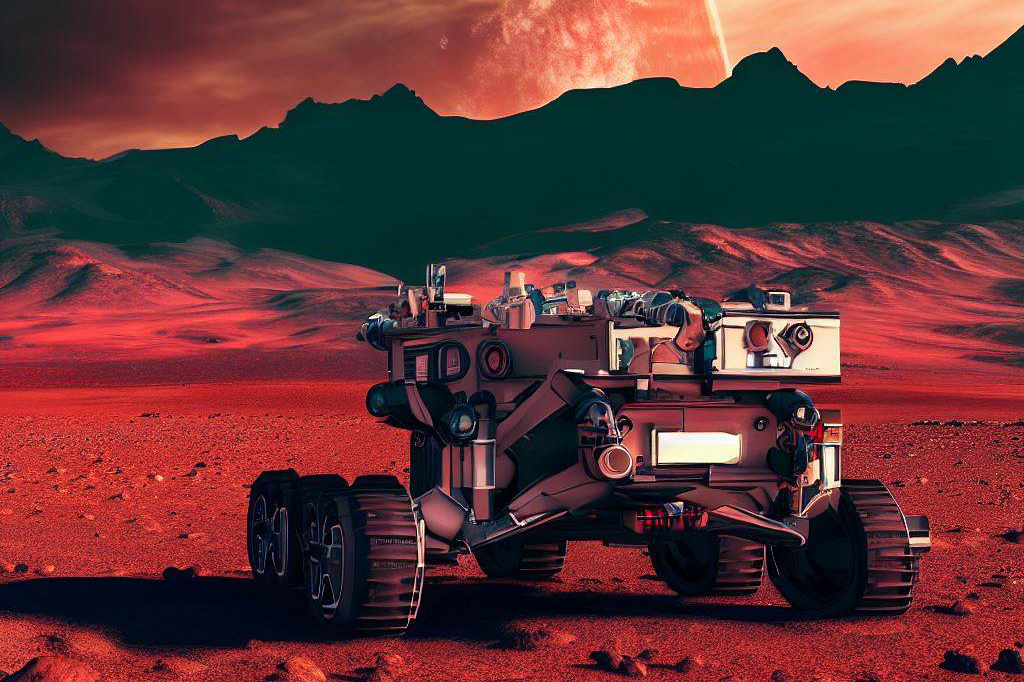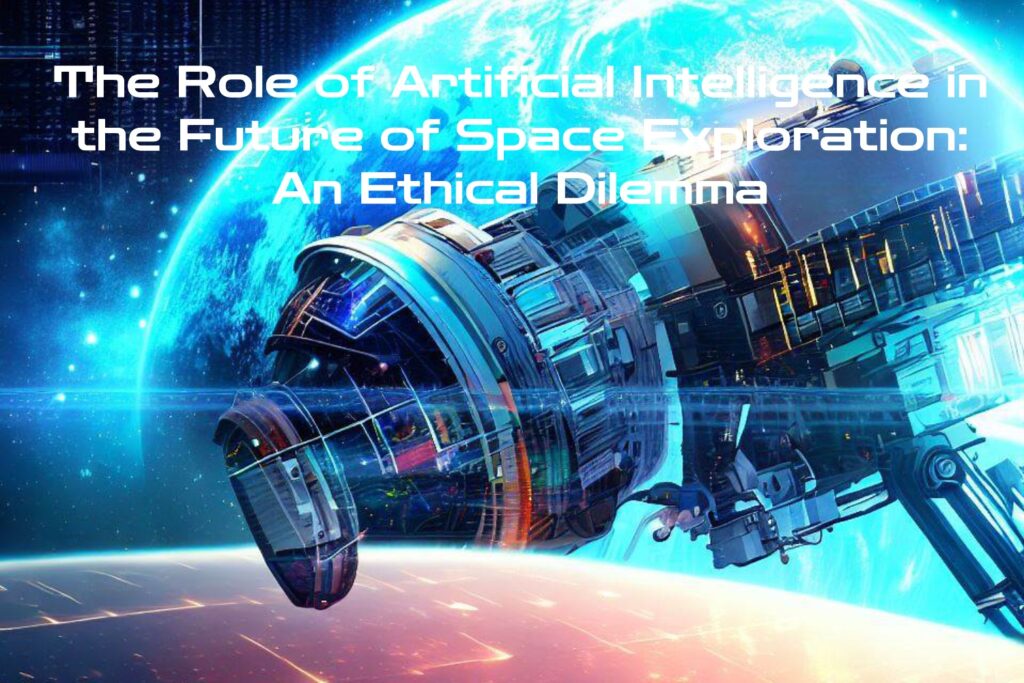The Role of Artificial Intelligence in the Future of Space Exploration: An Ethical Dilemma
Artificial Intelligence and Space Exploration: A Match Made in Heaven?
Space exploration has always been an exciting topic for scientists, researchers, and the common man alike. The mysteries of the universe have long captivated our imagination, and it seems that with each passing year, we are getting closer to unraveling them. One crucial facet of this journey is the role that Artificial Intelligence (AI) plays in space exploration.
AI has been gaining popularity as an essential tool for space exploration in recent years due to its ability to collect data, analyze it with high accuracy and speed up processes. However, as with every new technology comes new ethical dilemmas.
AI has now become a vital component of space missions carried out by NASA and other space organizations worldwide. The use of AI technology on Earth allows us to control rovers remotely on planets like Mars or collect vast amounts of data from deep space telescopes.
With AI’s help, we can quickly sift through these volumes of data to identify specific patterns or anomalies that could lead us to new discoveries. However, even though AI does offer significant benefits when used in space exploration missions, there are serious ethical concerns associated with its use.

One such issue is whether using robots programmed with artificial intelligence will make humans redundant in space missions altogether? Will they replace human astronauts entirely?
If so, what impact will this have on our technological advancements? Another point for consideration is how much trust should we place in machines while exploring uncharted territories?
Will machines be able to make decisions on their own if they encounter something unexpected or potentially dangerous? Who would be responsible if something goes wrong during a mission due to the machine’s malfunction?
These are crucial questions that need answers before we can fully realize the potential benefits that AI offers when used in space exploration missions. We need to develop a framework that will allow us to leverage AI’s capabilities while also ensuring that we have the necessary safeguards in place to prevent unintended consequences.
The Benefits of AI in Space Exploration
Increased Efficiency and Accuracy in Data Collection and Analysis

Artificial intelligence has the potential to revolutionize the way we collect and analyze data in space exploration. With advanced algorithms, AI technology can process huge amounts of data at a much faster rate than humans ever could.
This allows mission scientists to make more informed decisions in real-time, without having to wait for data analysis results from Earth. AI can also improve accuracy when it comes to identifying objects or phenomena in space.
For example, NASA’s Kepler mission used machine learning algorithms to detect exoplanets that were previously missed by human analysis. This led to the discovery of thousands of new planets outside our solar system.
Ability to Perform Tasks Too Dangerous or Difficult for Humans

Space exploration is a dangerous job, with many risks involved for astronauts who journey into space. With the use of AI technology, robots can be sent into hazardous environments instead, allowing them to perform tasks too dangerous or difficult for humans.
One example is NASA’s Mars Rover mission, where a robotic rover was sent to explore the surface of Mars on behalf of humans on Earth. The rover was able to collect samples and conduct experiments while being controlled from Earth with minimal risk involved.
Potential for Discovering New Information About Our Universe
The potential for discovering new information about our universe is perhaps one of the most exciting benefits of using AI in space exploration. With advanced algorithms and machine learning capabilities, AI technology can help identify patterns or anomalies that could lead to groundbreaking discoveries.
For example, NASA’s Wide-field Infrared Survey Explorer (WISE) mission used AI algorithms to scan vast areas of space and identify previously unknown asteroids and comets. These discoveries have helped us better understand the origins and evolution of our solar system.
Overall, there are many benefits associated with using AI in space exploration. From improved efficiency and accuracy in data collection and analysis, to the ability to perform tasks too dangerous or difficult for humans, and even the potential for discovering new information about our universe, AI technology has the potential to revolutionize the way we explore space.
The Risks and Ethical Concerns of AI in Space Exploration
Dependence on technology that could fail or malfunction

One of the biggest risks associated with using AI in space exploration is the dependence on technology that could fail or malfunction. In the vast expanse of space, there may be no way to repair such failures, thus rendering entire missions useless.
This risk is not limited to just hardware malfunctions alone, but also software glitches that can cause issues with data collection and processing. While AI has certainly increased the efficiency of data collection and analysis, there is always a risk associated with relying too heavily on this technology.
Lack of human oversight leading to potential mistakes or unintended consequences
Another concern associated with using AI in space exploration is the possibility of a lack of human oversight leading to mistakes or unintended consequences. While algorithms can be incredibly accurate at analyzing data and making decisions based on that analysis, they are not infallible.
There are certain situations where human judgment may be necessary to prevent errors from occurring. Additionally, there may be ethical considerations that an algorithm cannot take into account without human intervention.
Ethical considerations regarding the treatment of artificially intelligent beings
A third ethical concern related to AI in space exploration is how we treat artificially intelligent beings themselves. As we continue to develop more advanced forms of AI, it is possible that these technologies will become sentient in some way.
If this occurs, we must consider how we treat these entities from an ethical standpoint. Do they have rights?
Are they deserving of respect? These are all important questions that must be considered as we move forward with our use and development of artificial intelligence in space exploration.
While the benefits associated with using AI in space exploration are clear, it is important to also consider the potential risks and ethical concerns associated with this technology as well. By doing so, we can ensure that we are making informed decisions about the use of AI in space exploration and taking steps to mitigate any negative effects that may arise.
Case Study: The Mars Rover Mission
Overview of the Mars Rover mission and its use of AI technology

The Mars Rover mission has been one of the most successful examples of AI technology in space exploration. Launched in 2012, the rover was equipped with a range of sophisticated sensors and instruments that allowed it to collect data about the Martian environment. This data was then transmitted back to Earth, where it was analyzed by a team of scientists.
One of the key features that made this mission unique was its use of AI technology. The rover was programmed to make decisions based on its surroundings and adjust its behavior accordingly.
For example, if it encountered an obstacle or an interesting object, it could autonomously decide whether to investigate further or continue on its path. This level of autonomy allowed the rover to operate for years without human intervention.
Discussion of ethical dilemmas faced during the mission, such as balancing scientific discovery with preservation efforts
Despite its success, the Mars Rover mission also raised a number of ethical dilemmas that highlighted some of the risks associated with using AI technology in space exploration. One such dilemma was how best to balance scientific discovery with preservation efforts.
On the one hand, there was a desire among scientists to explore as much as possible and gather as much data as they could about Mars. However, this approach could also cause damage to Martian ecosystems and potentially even contaminate the planet with Earth-based organisms.
To address these concerns, NASA implemented strict guidelines for how the rover should behave when encountering potentially sensitive areas on Mars. For example, if it detected signs of water or other potential indicators of life, it would not be allowed to approach too closely or take samples that could harm these areas.
Ultimately, this case study shows both the potential benefits and risks associated with using AI technology in space exploration. While there are clear advantages in terms of efficiency and accuracy, these must be balanced with ethical considerations to ensure that we do not cause unintended harm or damage to the environments we explore.
Future Implications and Considerations
AI Advancements That Could Revolutionize Space Exploration

As AI technology continues to advance, we can expect some exciting changes in the field of space exploration. One possible advancement is the development of autonomous spacecraft that can make decisions on their own, without any human intervention.
This would allow us to explore further into space than ever before, as well as vastly improve our ability to collect data. Another potential advancement is increased human-machine collaboration in space exploration missions.
With AI technology, astronauts could use robots or virtual assistants to assist them in their work, providing more efficient and accurate results. Additionally, AI could be used to aid in crew selection for long-term space missions, identifying individuals whose skills complement each other and who are best suited for the task at hand.
The Continued Ethical Debates Surrounding AI in Space Exploration
Despite the numerous benefits that AI technology offers for space exploration, many ethical questions remain unanswered. One major debate centers around the potential elimination of human jobs as a result of increased automation in space exploration tasks. Moreover, there are concerns about how we should treat artificially intelligent beings developed for use during these missions.
Should they be granted certain rights? Should they have a degree of autonomy or decision-making power?
These are difficult questions that will need to be addressed as we continue to push forward with this technology. There is concern over what kind of unintended consequences could arise from our reliance on AI technology.
As humans become less involved in decision-making processes during missions due to automation and machine learning algorithms replace traditional ways of analyzing data obtained from space probes or telescopes (e.g., by using pattern recognition), it’s possible that mistakes may go uncorrected until it’s too late. This underscores the importance of continued discussion regarding ethical implications related to these technologies so we can ensure they are used safely and for the betterment of humanity.
Benefits and Risks of Using AI in Space Exploration
The use of AI in space exploration presents both benefits and risks. On one hand, AI technology can increase efficiency and accuracy in data collection, perform tasks that are too dangerous or difficult for humans, and lead to potential discoveries about our universe. On the other hand, there are significant ethical concerns surrounding the use of AI in space exploration such as dependence on technology that could fail or malfunction, lack of human oversight leading to potential mistakes or unintended consequences, and ethical considerations regarding the treatment of artificially intelligent beings.
Continued Consideration
It is important to continue discussing and considering the implementation of AI technology in space exploration. This includes not only exploring ways to mitigate the risks associated with using this technology but also examining how we should ethically treat artificially intelligent beings that may be used on future missions.
One possible solution is implementing guidelines or regulations that ensure human oversight during all stages of space exploration involving AI technology. Another solution is developing training programs for astronauts to understand how to communicate ethically with artificially intelligent beings.
While there are many ethical dilemmas associated with using AI in space exploration, it is clear that this technology has great potential for advancing our understanding of our universe. With careful consideration and continued discussion on these issues by scientists and policymakers alike, we can ensure the safe and ethical use of artificial intelligence in future space exploration missions.

C M, a seasoned editor, journalist, and consultant, is deeply fascinated by the convergence of technology, space, and the future of humanity.
With a particular interest in transhumanity, futurology, and the philosophical and ethical dimensions of these domains, C M serves as the lead contributor to SpaceSpotlight and TranscendSphere.
When not penning insightful articles on these rapidly evolving fields, C M indulges in their love for podcasts and books, proudly embracing their status as a ‘Happy Nerd Extraordinaire!’



